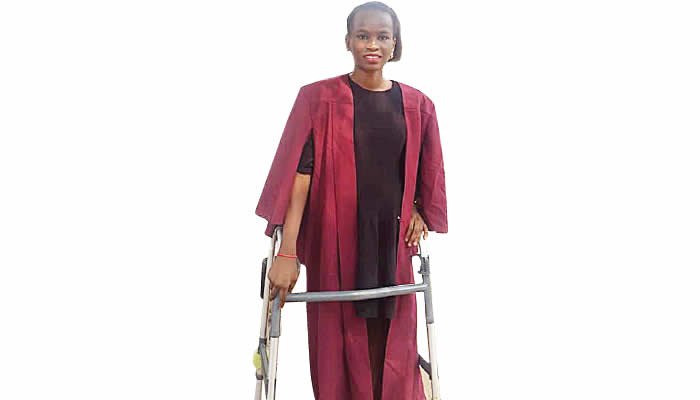
23-year-old Joy Sanni graduated with first class honours in Cell Biology and Genetics at the University of Lagos despite battling sickle cell anaemia. She tells ALEXANDER OKERE about her struggles and triumph
What was growing up like for you as a child with sickle cell anaemia?
I am the last born of my family. Growing up as a child with sickle cell anaemia was a terrible experience. I did not feel normal.
Did you have difficulties interacting and keeping up with other kids in your neighbourhood?
Anytime I went out to play with friends, I would return home with severe pains in my joints and bones that made me cry so much. I was exempted from a lot of activities, including playing sports at school or going camping with friends. Also, I skipped school a lot due to frequent pain and long hospital stays. It was like living a life of uncertainty – one minute, I could be fine, and the next minute, I could be in tears experiencing the worst pain.
I had difficulties interacting with other kids in my neighbourhood. I did not have a chance to mingle with my peers because I was not allowed to participate in most activities other kids would normally participate in. After long hospital stays, it was hard most times to pick up my social life again. I would say it made me a reserved kid.
What kind of thoughts did you have when you were diagnosed with avascular necrosis days after you received your offer of admission to the university?
When I was diagnosed with avascular necrosis, I was really sad and devastated because I had just got an offer of admission to the university. I kept imagining how I would cope in school with a walking aid, and what type of reactions I would get from people at school.
Can you describe the pain you felt?
I felt a very sharp and severe pain in my hip joint. At first, I thought it was a sickle cell crisis. I was treated at a hospital for pain crisis. However, the pain persisted and they had to refer me to an orthopaedic hospital where I was diagnosed with avascular necrosis of the hip.
You were advised to use a walking frame but you later chose to walk unaided and endure the pain. Why did you do that?
I felt ashamed moving about with the walking frame and dragging it along to classes all the time. People stared at me a lot. Some stared with a pitying look, and others, it was hard to tell what went through their minds. I just got tired of the whole attention the walking frame brought. I even got asked by a few people if I was born disabled.
How did this challenge affect you at school as a fresh student?
As a fresh student, it was really a struggle. It was my first time being away from home because I never attended a boarding school growing up. So, taking care of myself in a school hostel for the first time and having to do that, while being physically-challenged was double work. Also, as a science student, I had to attend laboratory practicals. The school’s laboratories are located upstairs. A particular lab we used most often was located on the third floor in my faculty. That was another struggle – taking the stairways to go for practicals. It was hard conveying my walking frame on the stairway. And even when I had started walking on my own, it was painful climbing the stairs.
Another major challenge was moving from my hostel to classes or the laboratory at my faculty. The car park was still at a distant location from my hostel. And when I eventually got to the car park, I would meet a long queue of people also waiting to get a cab. The cabs get filled up fast and most times, the drivers don’t have the patience to wait for the process of folding my walking frame. So I have to just walk and drag it along to classes. At some point, I arranged with a cab driver to pick me up from the hostel every morning (at a higher price). But he was inconsistent and didn’t show up most times. Most times, I would look all sweaty to class. It was a huge exercise dragging the heavy walking frame with me while trying to keep weight off my legs.
How did your parents feel about it, knowing the pain you had to endure?
They felt really bad that I had to go through all that I went through. And they cried, sometimes.
Did they want you to withdraw from school to complete the treatment?
Yes. At some point, they asked if I wanted to defer the admission for a year to take a break from school stress.
How else did your family support you?
My family supported me financially. They ensured that I never lacked my routine drugs and also provided my special needs. For instance, as a sickle cell patient, I have to stay away from sachet water and only drink clean table water. During my registration as a fresh student, I was still receiving treatment at the orthopaedic hospital. The school insisted that I had to be physically present for the fresher’s registration. My sister would assist me and stand in line for me while I sat somewhere until my signature or capturing was needed. My family has been there for me during my hospital stays and they encourage me and pray for me often. They have been supportive physically, morally, financially and spiritually.
You studied Cell Biology and Genetics. Is that what you’ve always wanted to study and what was the motivation?
What I had always wanted to study is Medicine. I put in for Medicine and Surgery at UNILORIN in my first Unified Tertiary Matriculation Examination. I passed the exams, but for some reason, I wasn’t selected. So when it was time to take my second UTME, I got scared of applying for the same course or choosing the same institution. I felt the course and school choice was too competitive and I might not get selected again.
So, I chose to study Biochemistry at the University of Lagos. I got admitted on merit. However, I had to change my course in my second year because from 200 Level, Biochemistry students at UNILAG receive lectures at a distant college outside Akoka and that was going to be stressful for me. So I changed my course to Cell Biology and Genetics which was closer and also aligned with my area of interest.
As a fresh student, did you set an academic target for yourself?
Yes. As a fresh student, I was determined to finish with an excellent result.
Did you have a study routine? What was it like?
I tend to assimilate better in the mornings. So, I read my notes when I wake up, before going for lectures. I start studying from the beginning of every semester to avoid overworking myself during exam periods. I also draft out a reading timetable a month before my exams to keep me organised and I revise a lot in my free time.
What did you have to forgo or deny yourself to ensure that you had good results?
I tried as much as possible to preserve my health, energy and time for my academic work. So, I stayed away from stressful and unnecessary activities that could possibly cause me to fall sick. I wear warm clothes during cold weather, slept under a mosquito net and I drank a lot of water. All of these were precautions to avoid crisis triggers like dehydration, cold, malaria and stress. However, sickle cell is an unpredictable illness. I could do all of these and still fall sick.
What was your grade point average in your first year at the university?
In my first year, I had 4.0 GPA.
How did that make you feel?
I felt happy about the result because it was a good start and I made up my mind to go higher from there.
Did you get the right support from your classmates and lecturers?
I got the right support from a few course mates that I was close to. They helped with their notes for times that I missed classes and explained the lectures I missed while I was on admission at the medical centre or hospital.
Can you describe in detail the worst moments you had while studying for your first degree?
One of my worst moments was New Year’s Day in 2020 when I had to spend my crossover on the hospital bed. My other worse moments were the times I fell sick during exam periods. I used to be worried that I might carry over the courses if I missed the exams. I used to plead with my doctors to let me leave for the exams and come back to continue treatment. So, I used to go to the exam hall with the plasters and the drip line then return to the medical centre when I finished taking the exams.
Other times, when my doctors didn’t see that I was fit to leave the hospital, the examiners brought my question papers to me and I took the exams on the hospital bed. My near-death experience was the time I had a really terrible crisis that caused my oxygen level to become extremely low that I had to be placed on oxygen for weeks and referred to a specialist hospital. It was another sickle cell complication called acute chest syndrome. It came with chronic coughs too, but it has been treated.
How did the workers at the university medical centre react when they saw you studying on the sickbed?
When the nurses and doctors saw me studying on the sickbed, they were shocked and admired my zeal but most times, they advised me to drop my book and rest.
What was your first impression when you saw your Cumulative Grade Point Average confirming that you had a first class?
I was full of excitement. My mom was really happy, and she was so excited to share the news with everyone. A lot of my classmates were surprised, but the ones that were close to me were not surprised because they witnessed how hard I studied despite the challenges and they were aware of my results at the end of most semesters.
Having graduated with a first class, what is your plan?
My desire is to get a master’s abroad in Public Health because I would love to make an impact on the health and well-being of people, and also have an opportunity to become an advocate for sickle cell disease and other chronic illnesses. I have also learnt and developed an interest in graphic design over time. So, I wish to take more courses in design to sharpen my skills and explore user interface and user experience.
Copyright PUNCH.
All rights reserved. This material, and other digital content on this website, may not be reproduced, published, broadcast, rewritten or redistributed in whole or in part without prior express written permission from PUNCH.
Contact: [email protected].com





